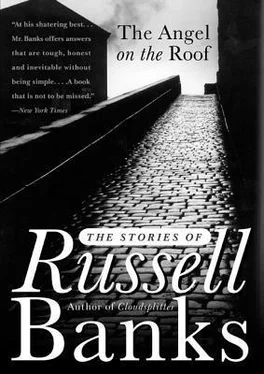On that snowy Saturday long ago, while my mother shrieked at my father and he barked back like an angry dog at her small, spitting face, I finally darted past them and fled the kitchen for the bedroom upstairs that I shared with my brother. It was a corner room with a pair of long windows on one side and our twin beds on the other. I remember lying on my bed, the one nearer the windows, reading a comic book, probably, with my wet feet on the clean bedspread, my arm crooked back to support my head, when suddenly the door flew open, and my mother was hovering above me like a great bird, clutching my shirt, and yanking me up beside her on the bed.
“Tell me!” she cried. “Tell me where you went! Don’t you lie to me, too!” She raised her hand and held it, palm out, a few inches from my face, as if she wanted me to read it, and she said, “Don’t you lie to me, or I swear, I’ll go crazy. Tell me where you went all afternoon! I know he took you to the bar, and he didn’t go to the depot. He just went to the bar. And a woman was there, I know it. Tell me the truth.”
I did not protest, I did not hesitate. I nodded my head up and down, and said, “We went to the bar in town. Nowhere else. A woman was there.”
She smiled, wiped the tears from her cheeks, and stood. “Good boy,” she said. “Good boy.” She turned and left the room. I lay back down trembling, and in a few seconds the buzz of the electric trains from the attic room in back replaced the buzz in my head, and I believe I fell asleep.
When George Rettstadt asked me if I wanted to see how he’d changed the rooms upstairs, where he said he had fixed up a large apartment for himself and his wife, I felt my chest tighten. “No,” I said very quickly, as if he had invited me to look steadily at a gruesome object. “No, that’s okay, I’m in kind of a hurry, anyhow,” I said, easing toward the door. “I wanted to walk around the yard a minute. I wanted to see where my brother and sister and I used to play. You know.”
Rettstadt said, “Sure, take all the time you want. Look at whatever you want to look at, everything’s unlocked. We never lock our doors out here, you know.” He opened the door, we shook hands, and I stepped out, breathing rapidly.
I did poke into the barn, but there was nothing about it that spoke to me. I stood inside the dark, cluttered building, and it was as if I were resting, idling, conserving energy for a more strenuous exertion to come.
A moment later, I had walked around the back of the house, crossed through the tangled brush and crumbling stone walls in the gathering dusk, and had come to stand next to the house on the far side, just below my old bedroom window.
My father’s heavy footsteps on the stairs had wakened me. He swung open the bedroom door, and I knew instantly, as if I had been standing downstairs in the kitchen between my mother and father, what had happened between them when she returned from my room armed with my betrayal, and with utter clarity and an almost welcoming acceptance, I knew what would happen now between him and me.
Violence produces white light and heat inside the head, and it happens both to the person who administers the beating and to the person who is beaten. It is never dark and cold. It happens at the instant of violent contact, before pain is felt, or fear, even, or guilt, so that pain, fear, and guilt come to be seen as merely the price one pays after the fact for this extraordinary immolation. It’s as if violence were a gift worth any price. Beyond the light and the heat, it’s a gift that engenders gorgeous dreams of retribution, and they last for tens of generations of fathers and children, husbands and wives — it’s a gift that shapes and drives fantasies of becoming huge as a glacier and hard as iron, fast as light, and sudden, like a volcano.
When you are hit in the head or slammed in the ribs and thrown to the floor by a powerful man, you find instantly that you are already halfway into a narrative that portrays your return to that moment, a narrative whose primary function is to provide reversal: to make the child into the man, the weak into the strong, the bad into the good. Listen to me : you are locked into that narrative, and no other terms, except those present at its inception, at the very opening of the drama, are available for the reversal — and, oh! when that happens, I have risen up from my narrow bed in the upstairs corner room I shared with my brother in Tobyhanna in 1952, and I overwhelm my dead father’s rage with an awful, endless rage of my own.
I eventually moved away from that spot beneath the window of the bedroom and got into my car and drove back to Tobyhanna and then on down to East Stroudsburg University, where that evening I gave my lecture to a small gathering of students and teachers, who seemed appreciative and expressed it with good-natured, gentle applause. Afterwards, we ate and drank a little wine in a local restaurant, and I drove home to New York City.
I will not go back to the house in Tobyhanna or to the bar in town, just as — after having been there once — I have not returned to any of the other houses we lived in when I was growing up, or to the apartments and barrooms in Florida and Boston and New Hampshire, where I first learned the need to protect other people from myself, people who loved me, male and female, and utter strangers, male and female. I go back to each, one time only, and I stand silently outside a window or a door, and I deliberately play back the horrible events that took place there. Then I move on.
I have traveled a lot in recent years, and consequently have completed almost all my journeys now. And when I have returned to every place where someone beat me or I beat someone, when there is no place left to go back to, then for the rest of my life I will have only my memories, these stories, to go to — for the heat, for the light, for the awful, endlessly recurring end of it.
Stacy didn’t mean to tell Noonan that when she was seventeen she was struck by lightning. She rarely told anyone and never a man she was attracted to or hoped soon to be sleeping with. Always, at the last second, an alarm in the center of her brain went off, and she changed the subject, asked a question, like, “How’s your wife?” or, “You ready for another?” She was a summertime bartender at Noonan’s, a sprawling log building with the main entrance and kitchen door facing the road and three large, plate-glass, dining-room windows in back and a wide, redwood deck cantilevered above the yard for taking in the great sunset views of the Adirondack Mountains. The sign said NOONAN’S FAMILY RESTAURANT, but in fact it was a roadhouse, a bar that — except in ski season and on summer weekends when drive-by tourists with kids mistakenly pulled in for lunch or supper — catered mostly to heavy drinkers from the several nearby hamlets.
The night that Stacy told Noonan about the lightning was also the night she shot and killed him. She had rented an A-frame at off-season rates in one of the hamlets and was working for Noonan only till the winter snows blew in from Quebec and Ontario. From May to November, she usually waited tables or tended bar in one or another of the area restaurants and the rest of the year taught alpine skiing at Whiteface Mountain. That was her real job, her profession, and she had the healthy, ash blond good looks of a poster girl for women’s Nordic sports: tall, broad-shouldered, flat-muscled, with square jaw and high cheekbones. Despite appearances, however, she viewed herself as a plain-faced, twenty-eight-year-old ex-athlete, with the emphasis on ex- . Eight years ago, she was captain of the nationally ranked St. Regis University downhill ski team, only a sophomore and already a star. Then in the Eastern Regionals she pushed her luck, took a spectacular, cartwheeling spill in the giant slalom, and shattered her left thigh. The video of the last ten seconds of her fall was still being shown at the front of the sports segment on the evening news from Plattsburgh.
Читать дальше












